Organizational Behaviour Report: Culture, Motivation, Teams
VerifiedAdded on 2021/02/20
|15
|4442
|25
Report
AI Summary
This report provides a comprehensive analysis of organizational behaviour, using Tesco Plc as a case study. It begins with an introduction to organizational behaviour, emphasizing its importance in achieving business goals. The main body evaluates the influence of organizational culture, politics, and power on individual and team behaviour, and performance. It then defines content and process theories of motivation, including Maslow's hierarchy of needs and equity theory, and discusses their application in a business context. The report further evaluates the effectiveness of teams versus ineffective teams, highlighting the key factors that contribute to team success. Finally, it provides recommendations for improving organizational behaviour within Tesco Plc, focusing on leadership practices, communication, and employee development. The report emphasizes the significance of these factors for enhancing productivity, profitability, and overall organizational success.
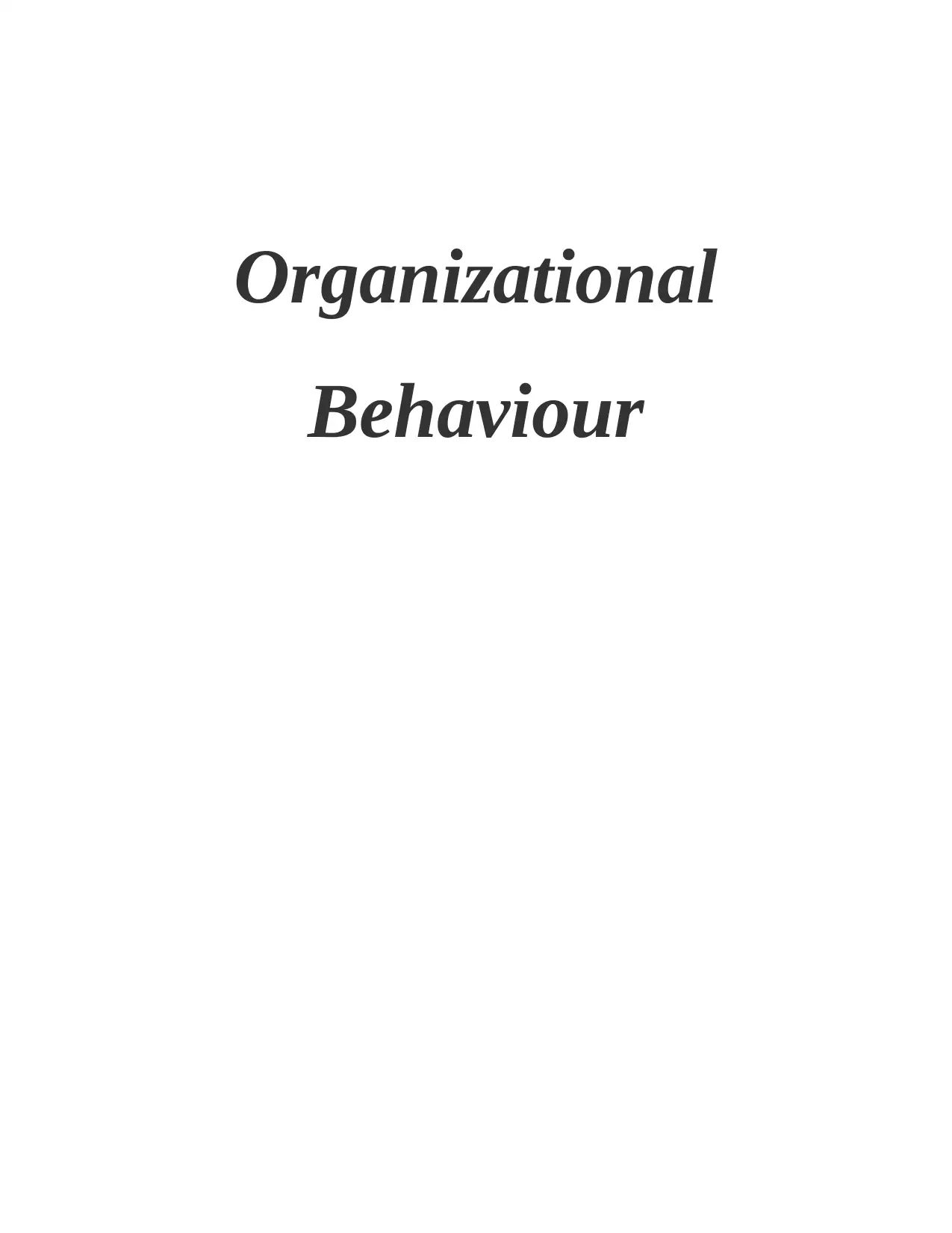
Organizational
Behaviour
Behaviour
Paraphrase This Document
Need a fresh take? Get an instant paraphrase of this document with our AI Paraphraser
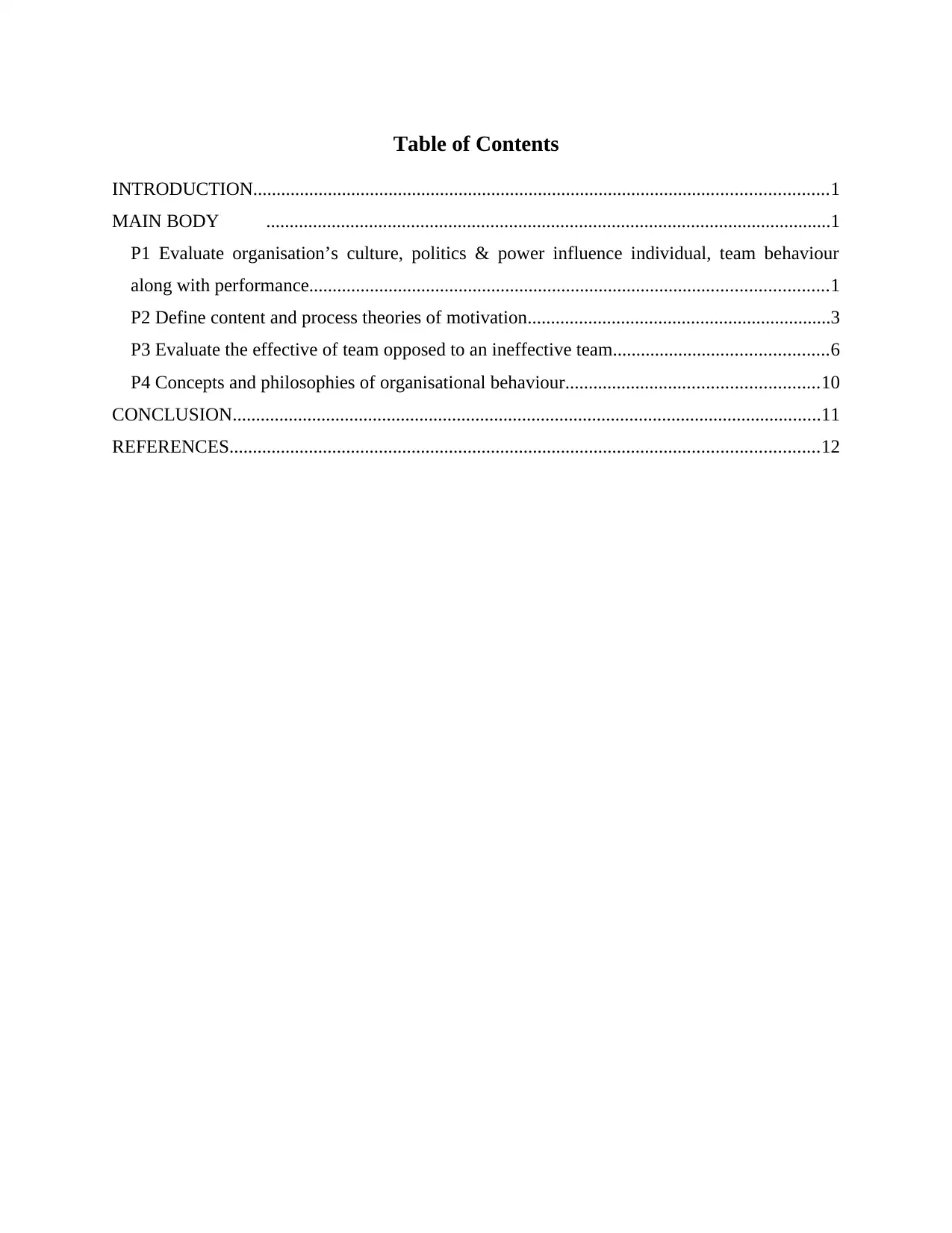
Table of Contents
INTRODUCTION...........................................................................................................................1
MAIN BODY .........................................................................................................................1
P1 Evaluate organisation’s culture, politics & power influence individual, team behaviour
along with performance...............................................................................................................1
P2 Define content and process theories of motivation.................................................................3
P3 Evaluate the effective of team opposed to an ineffective team..............................................6
P4 Concepts and philosophies of organisational behaviour......................................................10
CONCLUSION..............................................................................................................................11
REFERENCES..............................................................................................................................12
INTRODUCTION...........................................................................................................................1
MAIN BODY .........................................................................................................................1
P1 Evaluate organisation’s culture, politics & power influence individual, team behaviour
along with performance...............................................................................................................1
P2 Define content and process theories of motivation.................................................................3
P3 Evaluate the effective of team opposed to an ineffective team..............................................6
P4 Concepts and philosophies of organisational behaviour......................................................10
CONCLUSION..............................................................................................................................11
REFERENCES..............................................................................................................................12

⊘ This is a preview!⊘
Do you want full access?
Subscribe today to unlock all pages.

Trusted by 1+ million students worldwide
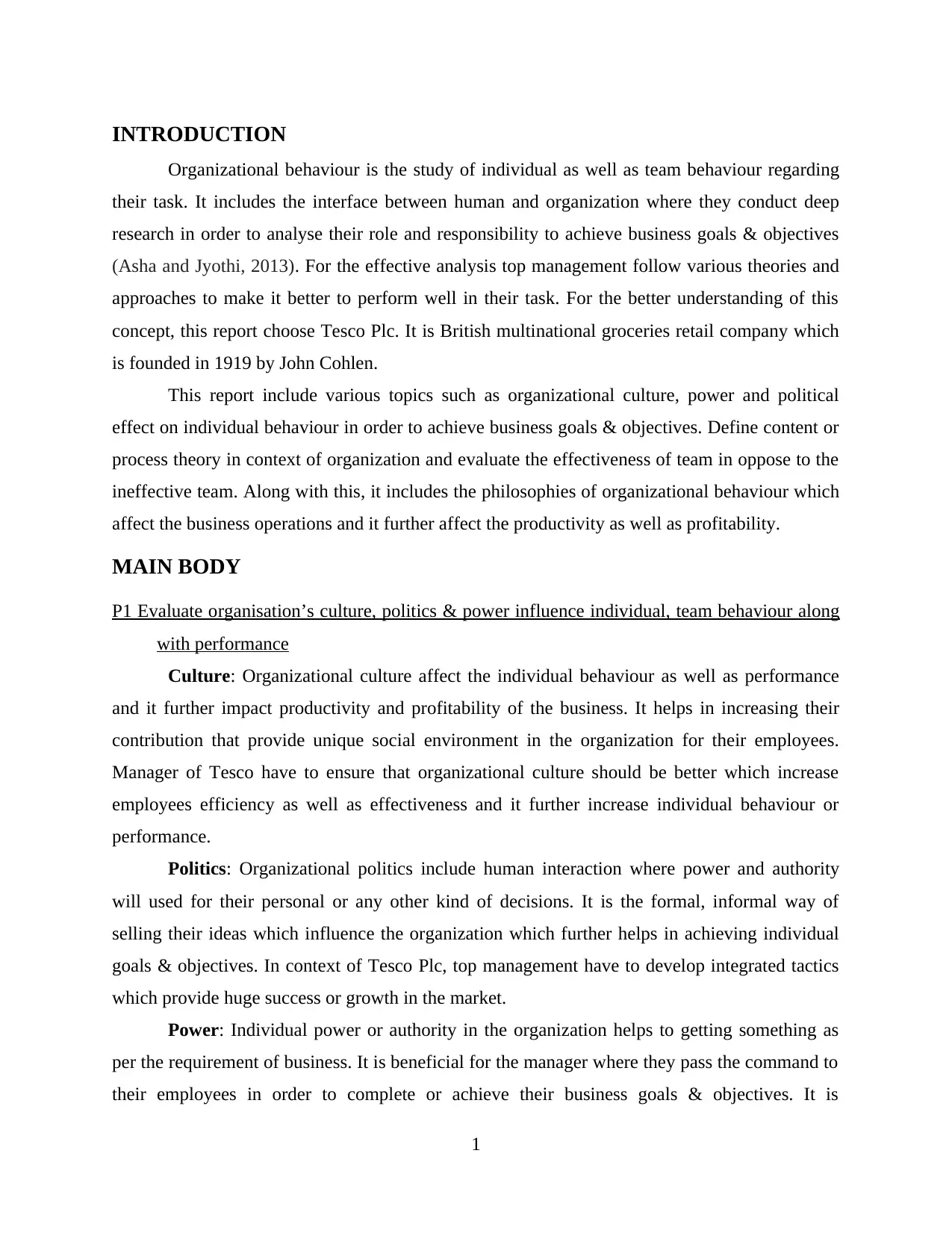
INTRODUCTION
Organizational behaviour is the study of individual as well as team behaviour regarding
their task. It includes the interface between human and organization where they conduct deep
research in order to analyse their role and responsibility to achieve business goals & objectives
(Asha and Jyothi, 2013). For the effective analysis top management follow various theories and
approaches to make it better to perform well in their task. For the better understanding of this
concept, this report choose Tesco Plc. It is British multinational groceries retail company which
is founded in 1919 by John Cohlen.
This report include various topics such as organizational culture, power and political
effect on individual behaviour in order to achieve business goals & objectives. Define content or
process theory in context of organization and evaluate the effectiveness of team in oppose to the
ineffective team. Along with this, it includes the philosophies of organizational behaviour which
affect the business operations and it further affect the productivity as well as profitability.
MAIN BODY
P1 Evaluate organisation’s culture, politics & power influence individual, team behaviour along
with performance
Culture: Organizational culture affect the individual behaviour as well as performance
and it further impact productivity and profitability of the business. It helps in increasing their
contribution that provide unique social environment in the organization for their employees.
Manager of Tesco have to ensure that organizational culture should be better which increase
employees efficiency as well as effectiveness and it further increase individual behaviour or
performance.
Politics: Organizational politics include human interaction where power and authority
will used for their personal or any other kind of decisions. It is the formal, informal way of
selling their ideas which influence the organization which further helps in achieving individual
goals & objectives. In context of Tesco Plc, top management have to develop integrated tactics
which provide huge success or growth in the market.
Power: Individual power or authority in the organization helps to getting something as
per the requirement of business. It is beneficial for the manager where they pass the command to
their employees in order to complete or achieve their business goals & objectives. It is
1
Organizational behaviour is the study of individual as well as team behaviour regarding
their task. It includes the interface between human and organization where they conduct deep
research in order to analyse their role and responsibility to achieve business goals & objectives
(Asha and Jyothi, 2013). For the effective analysis top management follow various theories and
approaches to make it better to perform well in their task. For the better understanding of this
concept, this report choose Tesco Plc. It is British multinational groceries retail company which
is founded in 1919 by John Cohlen.
This report include various topics such as organizational culture, power and political
effect on individual behaviour in order to achieve business goals & objectives. Define content or
process theory in context of organization and evaluate the effectiveness of team in oppose to the
ineffective team. Along with this, it includes the philosophies of organizational behaviour which
affect the business operations and it further affect the productivity as well as profitability.
MAIN BODY
P1 Evaluate organisation’s culture, politics & power influence individual, team behaviour along
with performance
Culture: Organizational culture affect the individual behaviour as well as performance
and it further impact productivity and profitability of the business. It helps in increasing their
contribution that provide unique social environment in the organization for their employees.
Manager of Tesco have to ensure that organizational culture should be better which increase
employees efficiency as well as effectiveness and it further increase individual behaviour or
performance.
Politics: Organizational politics include human interaction where power and authority
will used for their personal or any other kind of decisions. It is the formal, informal way of
selling their ideas which influence the organization which further helps in achieving individual
goals & objectives. In context of Tesco Plc, top management have to develop integrated tactics
which provide huge success or growth in the market.
Power: Individual power or authority in the organization helps to getting something as
per the requirement of business. It is beneficial for the manager where they pass the command to
their employees in order to complete or achieve their business goals & objectives. It is
1
Paraphrase This Document
Need a fresh take? Get an instant paraphrase of this document with our AI Paraphraser
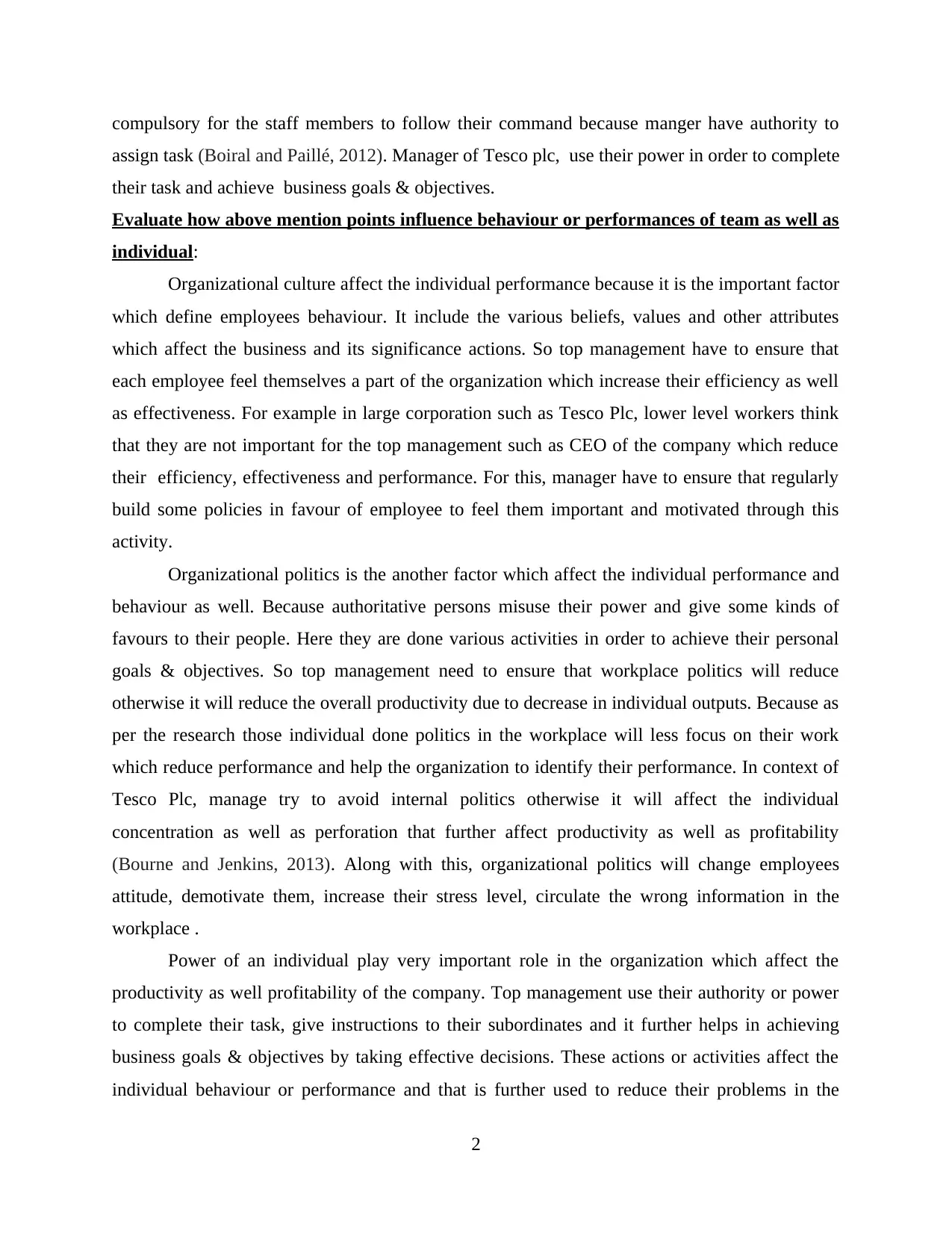
compulsory for the staff members to follow their command because manger have authority to
assign task (Boiral and Paillé, 2012). Manager of Tesco plc, use their power in order to complete
their task and achieve business goals & objectives.
Evaluate how above mention points influence behaviour or performances of team as well as
individual:
Organizational culture affect the individual performance because it is the important factor
which define employees behaviour. It include the various beliefs, values and other attributes
which affect the business and its significance actions. So top management have to ensure that
each employee feel themselves a part of the organization which increase their efficiency as well
as effectiveness. For example in large corporation such as Tesco Plc, lower level workers think
that they are not important for the top management such as CEO of the company which reduce
their efficiency, effectiveness and performance. For this, manager have to ensure that regularly
build some policies in favour of employee to feel them important and motivated through this
activity.
Organizational politics is the another factor which affect the individual performance and
behaviour as well. Because authoritative persons misuse their power and give some kinds of
favours to their people. Here they are done various activities in order to achieve their personal
goals & objectives. So top management need to ensure that workplace politics will reduce
otherwise it will reduce the overall productivity due to decrease in individual outputs. Because as
per the research those individual done politics in the workplace will less focus on their work
which reduce performance and help the organization to identify their performance. In context of
Tesco Plc, manage try to avoid internal politics otherwise it will affect the individual
concentration as well as perforation that further affect productivity as well as profitability
(Bourne and Jenkins, 2013). Along with this, organizational politics will change employees
attitude, demotivate them, increase their stress level, circulate the wrong information in the
workplace .
Power of an individual play very important role in the organization which affect the
productivity as well profitability of the company. Top management use their authority or power
to complete their task, give instructions to their subordinates and it further helps in achieving
business goals & objectives by taking effective decisions. These actions or activities affect the
individual behaviour or performance and that is further used to reduce their problems in the
2
assign task (Boiral and Paillé, 2012). Manager of Tesco plc, use their power in order to complete
their task and achieve business goals & objectives.
Evaluate how above mention points influence behaviour or performances of team as well as
individual:
Organizational culture affect the individual performance because it is the important factor
which define employees behaviour. It include the various beliefs, values and other attributes
which affect the business and its significance actions. So top management have to ensure that
each employee feel themselves a part of the organization which increase their efficiency as well
as effectiveness. For example in large corporation such as Tesco Plc, lower level workers think
that they are not important for the top management such as CEO of the company which reduce
their efficiency, effectiveness and performance. For this, manager have to ensure that regularly
build some policies in favour of employee to feel them important and motivated through this
activity.
Organizational politics is the another factor which affect the individual performance and
behaviour as well. Because authoritative persons misuse their power and give some kinds of
favours to their people. Here they are done various activities in order to achieve their personal
goals & objectives. So top management need to ensure that workplace politics will reduce
otherwise it will reduce the overall productivity due to decrease in individual outputs. Because as
per the research those individual done politics in the workplace will less focus on their work
which reduce performance and help the organization to identify their performance. In context of
Tesco Plc, manage try to avoid internal politics otherwise it will affect the individual
concentration as well as perforation that further affect productivity as well as profitability
(Bourne and Jenkins, 2013). Along with this, organizational politics will change employees
attitude, demotivate them, increase their stress level, circulate the wrong information in the
workplace .
Power of an individual play very important role in the organization which affect the
productivity as well profitability of the company. Top management use their authority or power
to complete their task, give instructions to their subordinates and it further helps in achieving
business goals & objectives by taking effective decisions. These actions or activities affect the
individual behaviour or performance and that is further used to reduce their problems in the
2
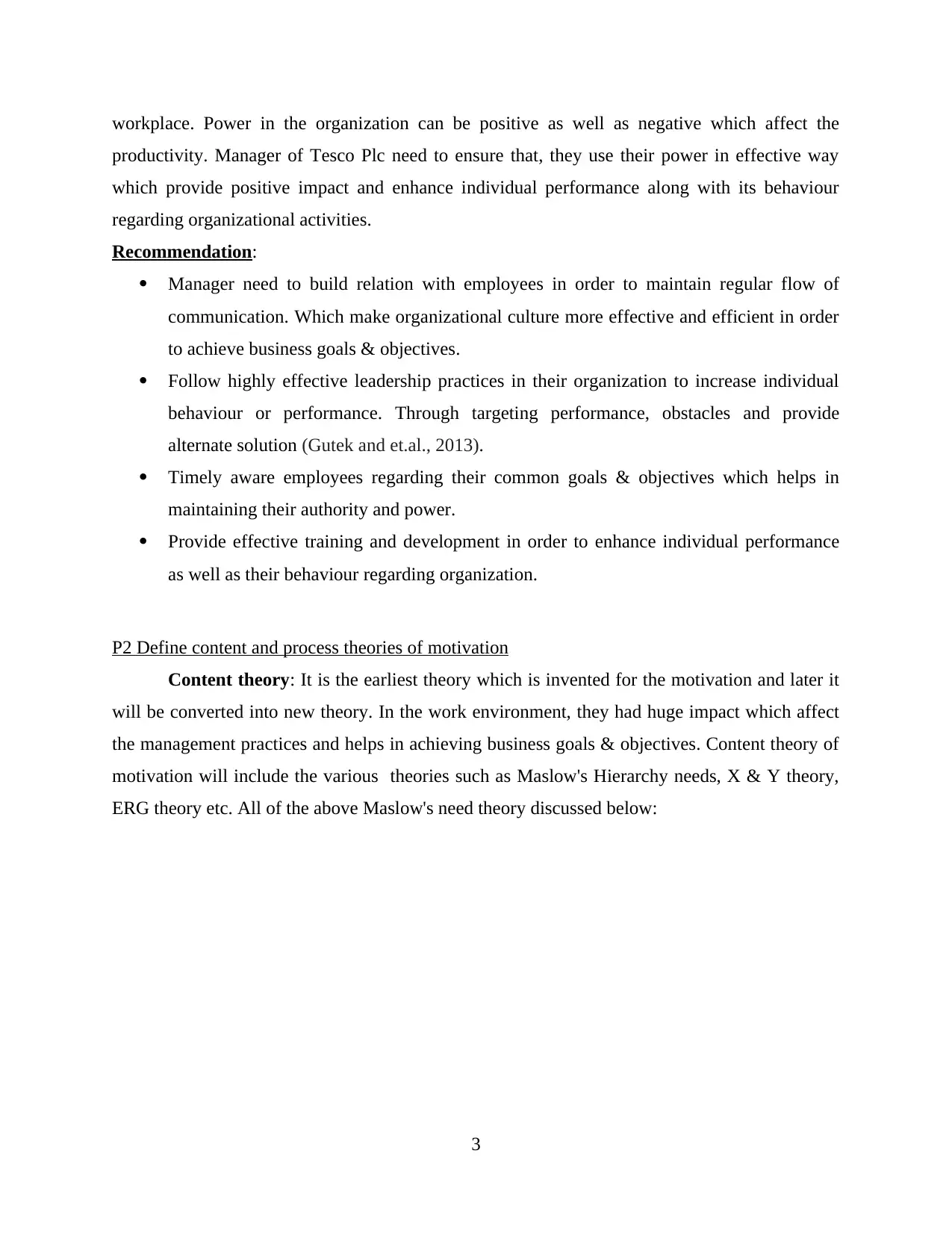
workplace. Power in the organization can be positive as well as negative which affect the
productivity. Manager of Tesco Plc need to ensure that, they use their power in effective way
which provide positive impact and enhance individual performance along with its behaviour
regarding organizational activities.
Recommendation:
Manager need to build relation with employees in order to maintain regular flow of
communication. Which make organizational culture more effective and efficient in order
to achieve business goals & objectives.
Follow highly effective leadership practices in their organization to increase individual
behaviour or performance. Through targeting performance, obstacles and provide
alternate solution (Gutek and et.al., 2013).
Timely aware employees regarding their common goals & objectives which helps in
maintaining their authority and power.
Provide effective training and development in order to enhance individual performance
as well as their behaviour regarding organization.
P2 Define content and process theories of motivation
Content theory: It is the earliest theory which is invented for the motivation and later it
will be converted into new theory. In the work environment, they had huge impact which affect
the management practices and helps in achieving business goals & objectives. Content theory of
motivation will include the various theories such as Maslow's Hierarchy needs, X & Y theory,
ERG theory etc. All of the above Maslow's need theory discussed below:
3
productivity. Manager of Tesco Plc need to ensure that, they use their power in effective way
which provide positive impact and enhance individual performance along with its behaviour
regarding organizational activities.
Recommendation:
Manager need to build relation with employees in order to maintain regular flow of
communication. Which make organizational culture more effective and efficient in order
to achieve business goals & objectives.
Follow highly effective leadership practices in their organization to increase individual
behaviour or performance. Through targeting performance, obstacles and provide
alternate solution (Gutek and et.al., 2013).
Timely aware employees regarding their common goals & objectives which helps in
maintaining their authority and power.
Provide effective training and development in order to enhance individual performance
as well as their behaviour regarding organization.
P2 Define content and process theories of motivation
Content theory: It is the earliest theory which is invented for the motivation and later it
will be converted into new theory. In the work environment, they had huge impact which affect
the management practices and helps in achieving business goals & objectives. Content theory of
motivation will include the various theories such as Maslow's Hierarchy needs, X & Y theory,
ERG theory etc. All of the above Maslow's need theory discussed below:
3
⊘ This is a preview!⊘
Do you want full access?
Subscribe today to unlock all pages.

Trusted by 1+ million students worldwide
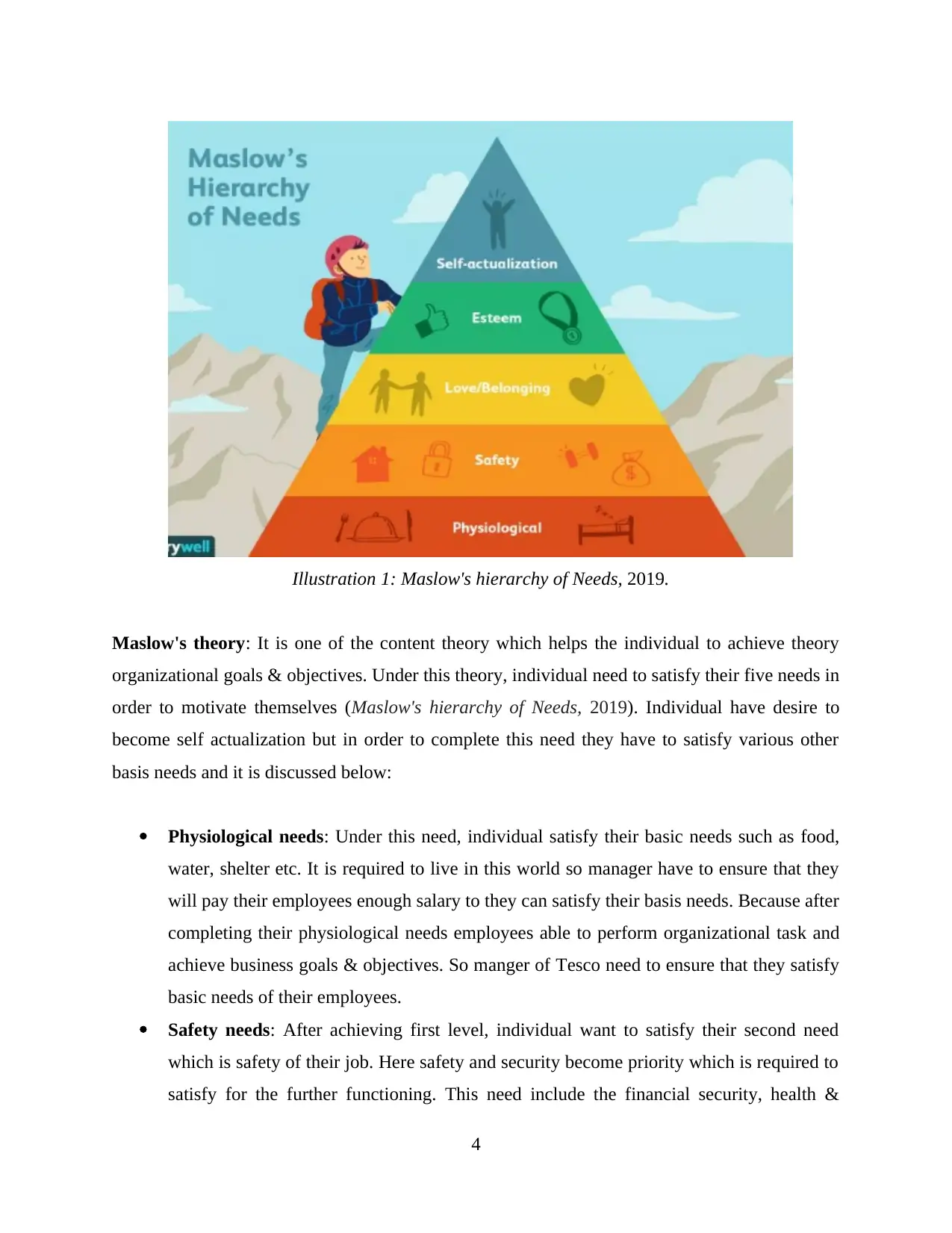
Illustration 1: Maslow's hierarchy of Needs, 2019.
Maslow's theory: It is one of the content theory which helps the individual to achieve theory
organizational goals & objectives. Under this theory, individual need to satisfy their five needs in
order to motivate themselves (Maslow's hierarchy of Needs, 2019). Individual have desire to
become self actualization but in order to complete this need they have to satisfy various other
basis needs and it is discussed below:
Physiological needs: Under this need, individual satisfy their basic needs such as food,
water, shelter etc. It is required to live in this world so manager have to ensure that they
will pay their employees enough salary to they can satisfy their basis needs. Because after
completing their physiological needs employees able to perform organizational task and
achieve business goals & objectives. So manger of Tesco need to ensure that they satisfy
basic needs of their employees.
Safety needs: After achieving first level, individual want to satisfy their second need
which is safety of their job. Here safety and security become priority which is required to
satisfy for the further functioning. This need include the financial security, health &
4
Maslow's theory: It is one of the content theory which helps the individual to achieve theory
organizational goals & objectives. Under this theory, individual need to satisfy their five needs in
order to motivate themselves (Maslow's hierarchy of Needs, 2019). Individual have desire to
become self actualization but in order to complete this need they have to satisfy various other
basis needs and it is discussed below:
Physiological needs: Under this need, individual satisfy their basic needs such as food,
water, shelter etc. It is required to live in this world so manager have to ensure that they
will pay their employees enough salary to they can satisfy their basis needs. Because after
completing their physiological needs employees able to perform organizational task and
achieve business goals & objectives. So manger of Tesco need to ensure that they satisfy
basic needs of their employees.
Safety needs: After achieving first level, individual want to satisfy their second need
which is safety of their job. Here safety and security become priority which is required to
satisfy for the further functioning. This need include the financial security, health &
4
Paraphrase This Document
Need a fresh take? Get an instant paraphrase of this document with our AI Paraphraser
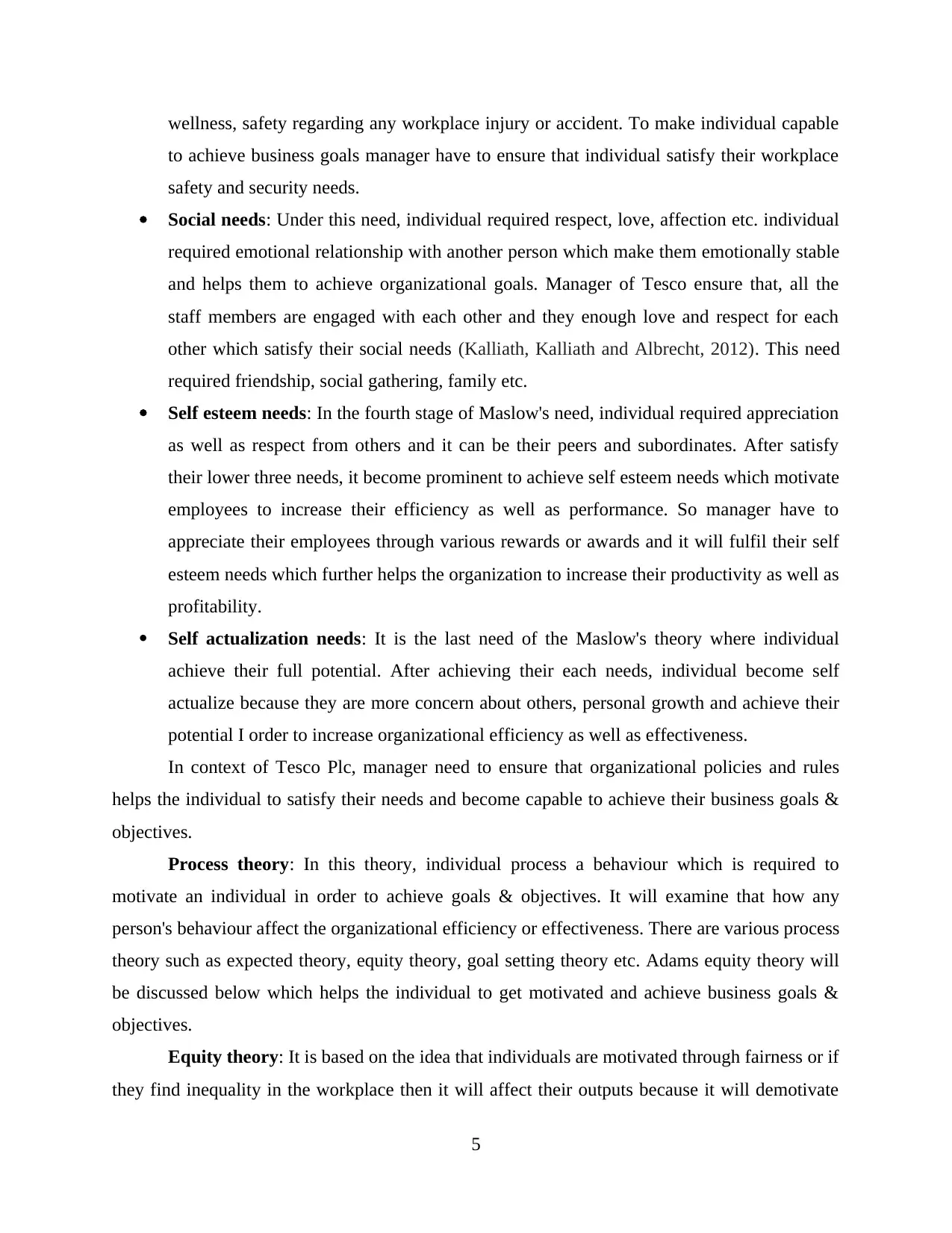
wellness, safety regarding any workplace injury or accident. To make individual capable
to achieve business goals manager have to ensure that individual satisfy their workplace
safety and security needs.
Social needs: Under this need, individual required respect, love, affection etc. individual
required emotional relationship with another person which make them emotionally stable
and helps them to achieve organizational goals. Manager of Tesco ensure that, all the
staff members are engaged with each other and they enough love and respect for each
other which satisfy their social needs (Kalliath, Kalliath and Albrecht, 2012). This need
required friendship, social gathering, family etc.
Self esteem needs: In the fourth stage of Maslow's need, individual required appreciation
as well as respect from others and it can be their peers and subordinates. After satisfy
their lower three needs, it become prominent to achieve self esteem needs which motivate
employees to increase their efficiency as well as performance. So manager have to
appreciate their employees through various rewards or awards and it will fulfil their self
esteem needs which further helps the organization to increase their productivity as well as
profitability.
Self actualization needs: It is the last need of the Maslow's theory where individual
achieve their full potential. After achieving their each needs, individual become self
actualize because they are more concern about others, personal growth and achieve their
potential I order to increase organizational efficiency as well as effectiveness.
In context of Tesco Plc, manager need to ensure that organizational policies and rules
helps the individual to satisfy their needs and become capable to achieve their business goals &
objectives.
Process theory: In this theory, individual process a behaviour which is required to
motivate an individual in order to achieve goals & objectives. It will examine that how any
person's behaviour affect the organizational efficiency or effectiveness. There are various process
theory such as expected theory, equity theory, goal setting theory etc. Adams equity theory will
be discussed below which helps the individual to get motivated and achieve business goals &
objectives.
Equity theory: It is based on the idea that individuals are motivated through fairness or if
they find inequality in the workplace then it will affect their outputs because it will demotivate
5
to achieve business goals manager have to ensure that individual satisfy their workplace
safety and security needs.
Social needs: Under this need, individual required respect, love, affection etc. individual
required emotional relationship with another person which make them emotionally stable
and helps them to achieve organizational goals. Manager of Tesco ensure that, all the
staff members are engaged with each other and they enough love and respect for each
other which satisfy their social needs (Kalliath, Kalliath and Albrecht, 2012). This need
required friendship, social gathering, family etc.
Self esteem needs: In the fourth stage of Maslow's need, individual required appreciation
as well as respect from others and it can be their peers and subordinates. After satisfy
their lower three needs, it become prominent to achieve self esteem needs which motivate
employees to increase their efficiency as well as performance. So manager have to
appreciate their employees through various rewards or awards and it will fulfil their self
esteem needs which further helps the organization to increase their productivity as well as
profitability.
Self actualization needs: It is the last need of the Maslow's theory where individual
achieve their full potential. After achieving their each needs, individual become self
actualize because they are more concern about others, personal growth and achieve their
potential I order to increase organizational efficiency as well as effectiveness.
In context of Tesco Plc, manager need to ensure that organizational policies and rules
helps the individual to satisfy their needs and become capable to achieve their business goals &
objectives.
Process theory: In this theory, individual process a behaviour which is required to
motivate an individual in order to achieve goals & objectives. It will examine that how any
person's behaviour affect the organizational efficiency or effectiveness. There are various process
theory such as expected theory, equity theory, goal setting theory etc. Adams equity theory will
be discussed below which helps the individual to get motivated and achieve business goals &
objectives.
Equity theory: It is based on the idea that individuals are motivated through fairness or if
they find inequality in the workplace then it will affect their outputs because it will demotivate
5
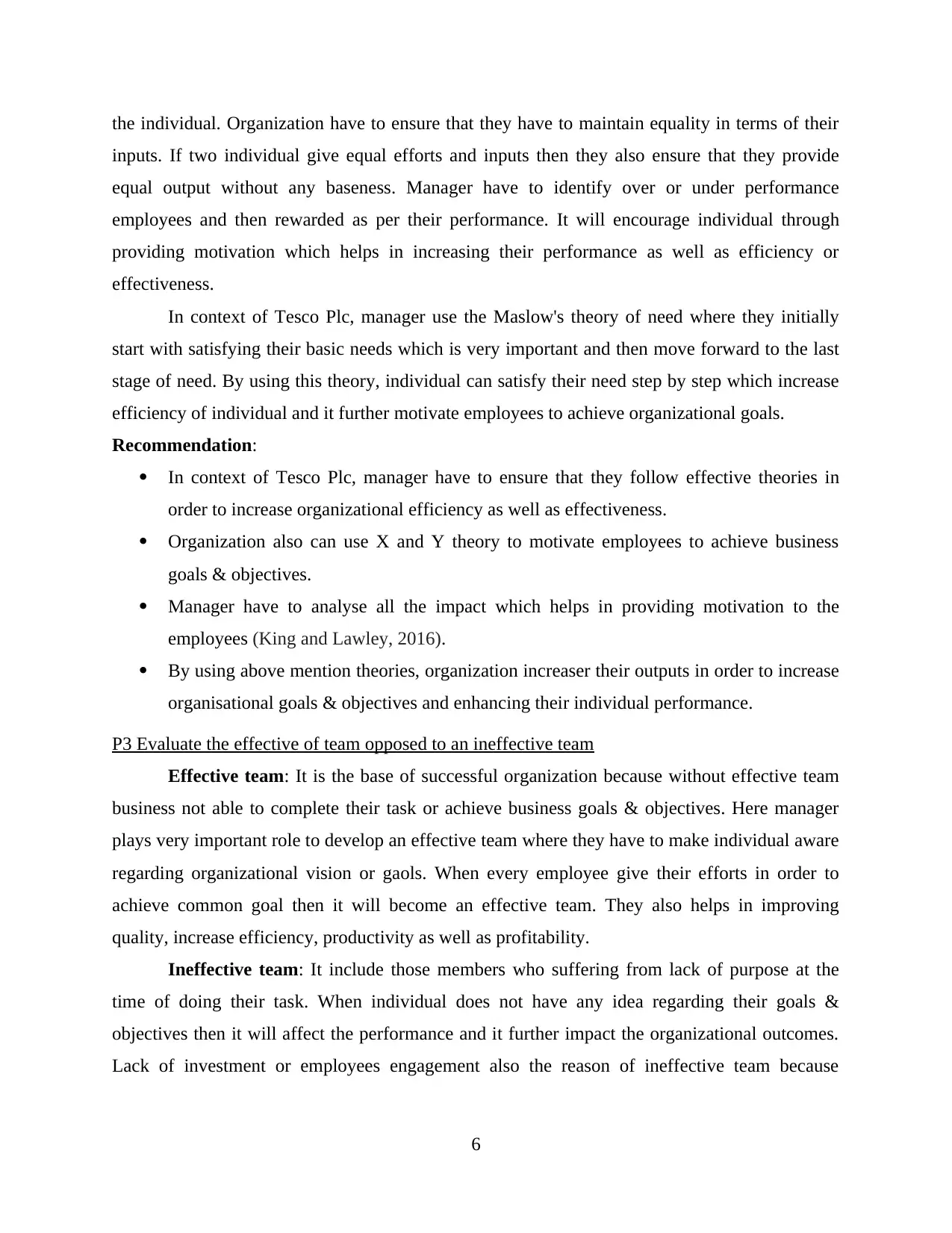
the individual. Organization have to ensure that they have to maintain equality in terms of their
inputs. If two individual give equal efforts and inputs then they also ensure that they provide
equal output without any baseness. Manager have to identify over or under performance
employees and then rewarded as per their performance. It will encourage individual through
providing motivation which helps in increasing their performance as well as efficiency or
effectiveness.
In context of Tesco Plc, manager use the Maslow's theory of need where they initially
start with satisfying their basic needs which is very important and then move forward to the last
stage of need. By using this theory, individual can satisfy their need step by step which increase
efficiency of individual and it further motivate employees to achieve organizational goals.
Recommendation:
In context of Tesco Plc, manager have to ensure that they follow effective theories in
order to increase organizational efficiency as well as effectiveness.
Organization also can use X and Y theory to motivate employees to achieve business
goals & objectives.
Manager have to analyse all the impact which helps in providing motivation to the
employees (King and Lawley, 2016).
By using above mention theories, organization increaser their outputs in order to increase
organisational goals & objectives and enhancing their individual performance.
P3 Evaluate the effective of team opposed to an ineffective team
Effective team: It is the base of successful organization because without effective team
business not able to complete their task or achieve business goals & objectives. Here manager
plays very important role to develop an effective team where they have to make individual aware
regarding organizational vision or gaols. When every employee give their efforts in order to
achieve common goal then it will become an effective team. They also helps in improving
quality, increase efficiency, productivity as well as profitability.
Ineffective team: It include those members who suffering from lack of purpose at the
time of doing their task. When individual does not have any idea regarding their goals &
objectives then it will affect the performance and it further impact the organizational outcomes.
Lack of investment or employees engagement also the reason of ineffective team because
6
inputs. If two individual give equal efforts and inputs then they also ensure that they provide
equal output without any baseness. Manager have to identify over or under performance
employees and then rewarded as per their performance. It will encourage individual through
providing motivation which helps in increasing their performance as well as efficiency or
effectiveness.
In context of Tesco Plc, manager use the Maslow's theory of need where they initially
start with satisfying their basic needs which is very important and then move forward to the last
stage of need. By using this theory, individual can satisfy their need step by step which increase
efficiency of individual and it further motivate employees to achieve organizational goals.
Recommendation:
In context of Tesco Plc, manager have to ensure that they follow effective theories in
order to increase organizational efficiency as well as effectiveness.
Organization also can use X and Y theory to motivate employees to achieve business
goals & objectives.
Manager have to analyse all the impact which helps in providing motivation to the
employees (King and Lawley, 2016).
By using above mention theories, organization increaser their outputs in order to increase
organisational goals & objectives and enhancing their individual performance.
P3 Evaluate the effective of team opposed to an ineffective team
Effective team: It is the base of successful organization because without effective team
business not able to complete their task or achieve business goals & objectives. Here manager
plays very important role to develop an effective team where they have to make individual aware
regarding organizational vision or gaols. When every employee give their efforts in order to
achieve common goal then it will become an effective team. They also helps in improving
quality, increase efficiency, productivity as well as profitability.
Ineffective team: It include those members who suffering from lack of purpose at the
time of doing their task. When individual does not have any idea regarding their goals &
objectives then it will affect the performance and it further impact the organizational outcomes.
Lack of investment or employees engagement also the reason of ineffective team because
6
⊘ This is a preview!⊘
Do you want full access?
Subscribe today to unlock all pages.

Trusted by 1+ million students worldwide
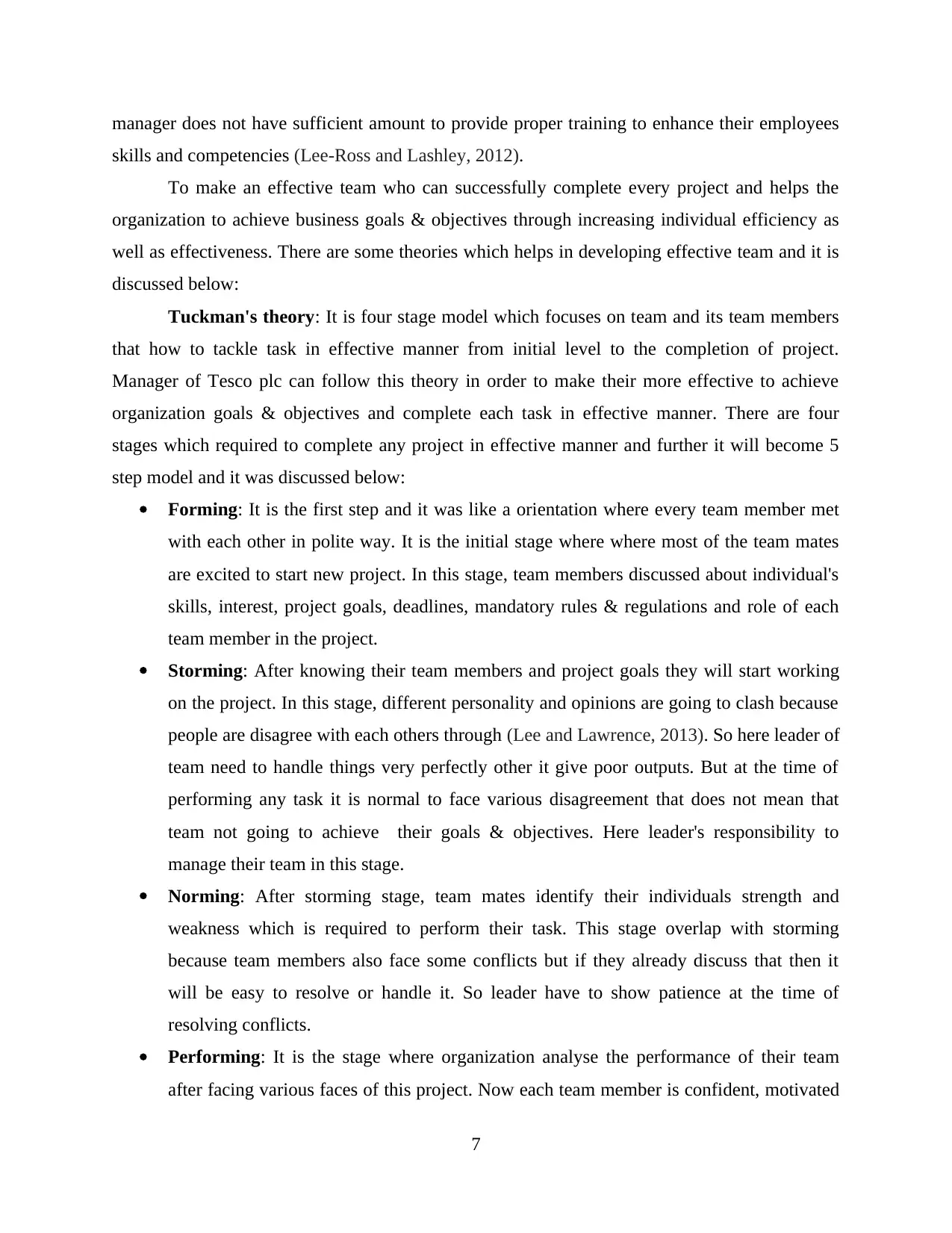
manager does not have sufficient amount to provide proper training to enhance their employees
skills and competencies (Lee-Ross and Lashley, 2012).
To make an effective team who can successfully complete every project and helps the
organization to achieve business goals & objectives through increasing individual efficiency as
well as effectiveness. There are some theories which helps in developing effective team and it is
discussed below:
Tuckman's theory: It is four stage model which focuses on team and its team members
that how to tackle task in effective manner from initial level to the completion of project.
Manager of Tesco plc can follow this theory in order to make their more effective to achieve
organization goals & objectives and complete each task in effective manner. There are four
stages which required to complete any project in effective manner and further it will become 5
step model and it was discussed below:
Forming: It is the first step and it was like a orientation where every team member met
with each other in polite way. It is the initial stage where where most of the team mates
are excited to start new project. In this stage, team members discussed about individual's
skills, interest, project goals, deadlines, mandatory rules & regulations and role of each
team member in the project.
Storming: After knowing their team members and project goals they will start working
on the project. In this stage, different personality and opinions are going to clash because
people are disagree with each others through (Lee and Lawrence, 2013). So here leader of
team need to handle things very perfectly other it give poor outputs. But at the time of
performing any task it is normal to face various disagreement that does not mean that
team not going to achieve their goals & objectives. Here leader's responsibility to
manage their team in this stage.
Norming: After storming stage, team mates identify their individuals strength and
weakness which is required to perform their task. This stage overlap with storming
because team members also face some conflicts but if they already discuss that then it
will be easy to resolve or handle it. So leader have to show patience at the time of
resolving conflicts.
Performing: It is the stage where organization analyse the performance of their team
after facing various faces of this project. Now each team member is confident, motivated
7
skills and competencies (Lee-Ross and Lashley, 2012).
To make an effective team who can successfully complete every project and helps the
organization to achieve business goals & objectives through increasing individual efficiency as
well as effectiveness. There are some theories which helps in developing effective team and it is
discussed below:
Tuckman's theory: It is four stage model which focuses on team and its team members
that how to tackle task in effective manner from initial level to the completion of project.
Manager of Tesco plc can follow this theory in order to make their more effective to achieve
organization goals & objectives and complete each task in effective manner. There are four
stages which required to complete any project in effective manner and further it will become 5
step model and it was discussed below:
Forming: It is the first step and it was like a orientation where every team member met
with each other in polite way. It is the initial stage where where most of the team mates
are excited to start new project. In this stage, team members discussed about individual's
skills, interest, project goals, deadlines, mandatory rules & regulations and role of each
team member in the project.
Storming: After knowing their team members and project goals they will start working
on the project. In this stage, different personality and opinions are going to clash because
people are disagree with each others through (Lee and Lawrence, 2013). So here leader of
team need to handle things very perfectly other it give poor outputs. But at the time of
performing any task it is normal to face various disagreement that does not mean that
team not going to achieve their goals & objectives. Here leader's responsibility to
manage their team in this stage.
Norming: After storming stage, team mates identify their individuals strength and
weakness which is required to perform their task. This stage overlap with storming
because team members also face some conflicts but if they already discuss that then it
will be easy to resolve or handle it. So leader have to show patience at the time of
resolving conflicts.
Performing: It is the stage where organization analyse the performance of their team
after facing various faces of this project. Now each team member is confident, motivated
7
Paraphrase This Document
Need a fresh take? Get an instant paraphrase of this document with our AI Paraphraser
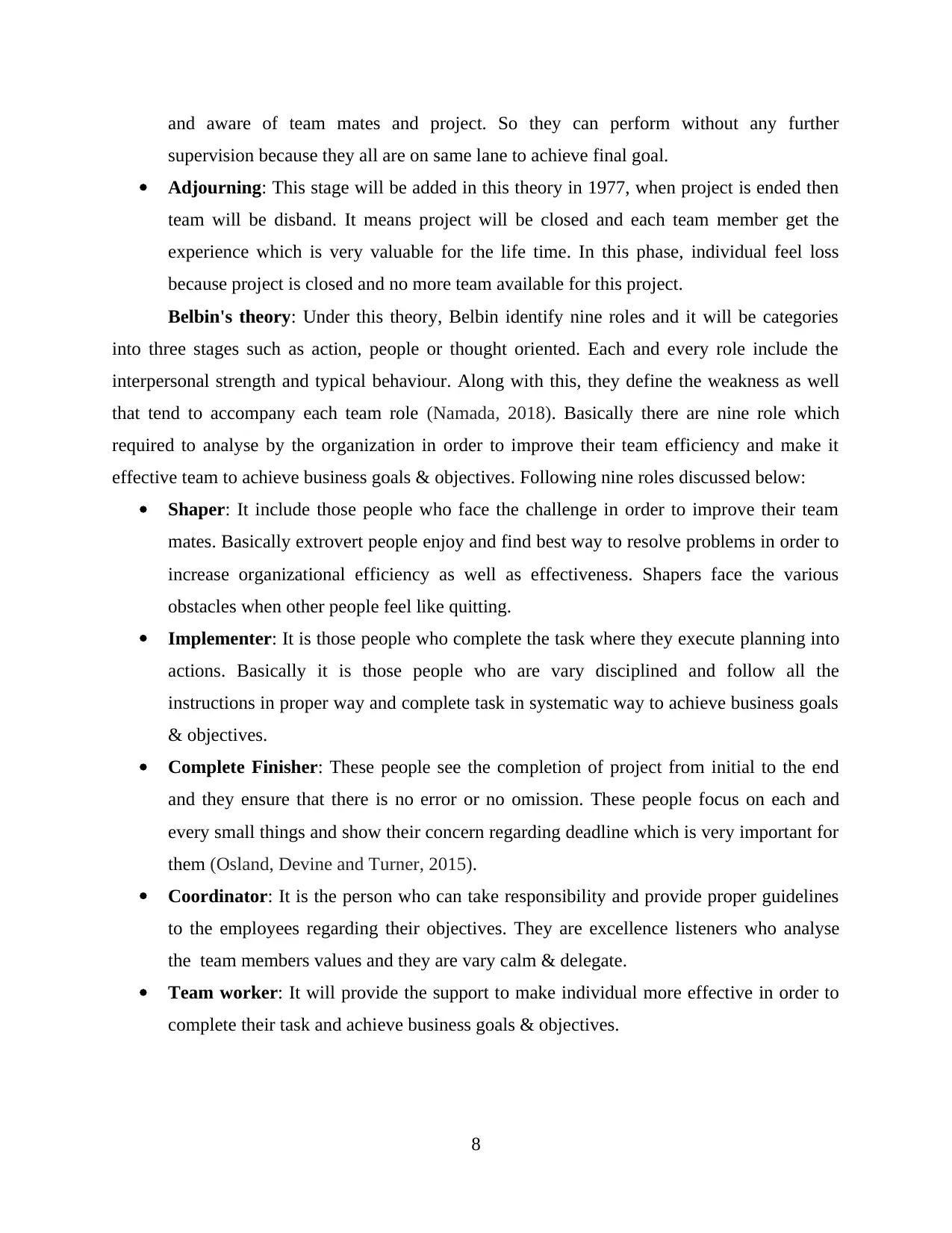
and aware of team mates and project. So they can perform without any further
supervision because they all are on same lane to achieve final goal.
Adjourning: This stage will be added in this theory in 1977, when project is ended then
team will be disband. It means project will be closed and each team member get the
experience which is very valuable for the life time. In this phase, individual feel loss
because project is closed and no more team available for this project.
Belbin's theory: Under this theory, Belbin identify nine roles and it will be categories
into three stages such as action, people or thought oriented. Each and every role include the
interpersonal strength and typical behaviour. Along with this, they define the weakness as well
that tend to accompany each team role (Namada, 2018). Basically there are nine role which
required to analyse by the organization in order to improve their team efficiency and make it
effective team to achieve business goals & objectives. Following nine roles discussed below:
Shaper: It include those people who face the challenge in order to improve their team
mates. Basically extrovert people enjoy and find best way to resolve problems in order to
increase organizational efficiency as well as effectiveness. Shapers face the various
obstacles when other people feel like quitting.
Implementer: It is those people who complete the task where they execute planning into
actions. Basically it is those people who are vary disciplined and follow all the
instructions in proper way and complete task in systematic way to achieve business goals
& objectives.
Complete Finisher: These people see the completion of project from initial to the end
and they ensure that there is no error or no omission. These people focus on each and
every small things and show their concern regarding deadline which is very important for
them (Osland, Devine and Turner, 2015).
Coordinator: It is the person who can take responsibility and provide proper guidelines
to the employees regarding their objectives. They are excellence listeners who analyse
the team members values and they are vary calm & delegate.
Team worker: It will provide the support to make individual more effective in order to
complete their task and achieve business goals & objectives.
8
supervision because they all are on same lane to achieve final goal.
Adjourning: This stage will be added in this theory in 1977, when project is ended then
team will be disband. It means project will be closed and each team member get the
experience which is very valuable for the life time. In this phase, individual feel loss
because project is closed and no more team available for this project.
Belbin's theory: Under this theory, Belbin identify nine roles and it will be categories
into three stages such as action, people or thought oriented. Each and every role include the
interpersonal strength and typical behaviour. Along with this, they define the weakness as well
that tend to accompany each team role (Namada, 2018). Basically there are nine role which
required to analyse by the organization in order to improve their team efficiency and make it
effective team to achieve business goals & objectives. Following nine roles discussed below:
Shaper: It include those people who face the challenge in order to improve their team
mates. Basically extrovert people enjoy and find best way to resolve problems in order to
increase organizational efficiency as well as effectiveness. Shapers face the various
obstacles when other people feel like quitting.
Implementer: It is those people who complete the task where they execute planning into
actions. Basically it is those people who are vary disciplined and follow all the
instructions in proper way and complete task in systematic way to achieve business goals
& objectives.
Complete Finisher: These people see the completion of project from initial to the end
and they ensure that there is no error or no omission. These people focus on each and
every small things and show their concern regarding deadline which is very important for
them (Osland, Devine and Turner, 2015).
Coordinator: It is the person who can take responsibility and provide proper guidelines
to the employees regarding their objectives. They are excellence listeners who analyse
the team members values and they are vary calm & delegate.
Team worker: It will provide the support to make individual more effective in order to
complete their task and achieve business goals & objectives.
8
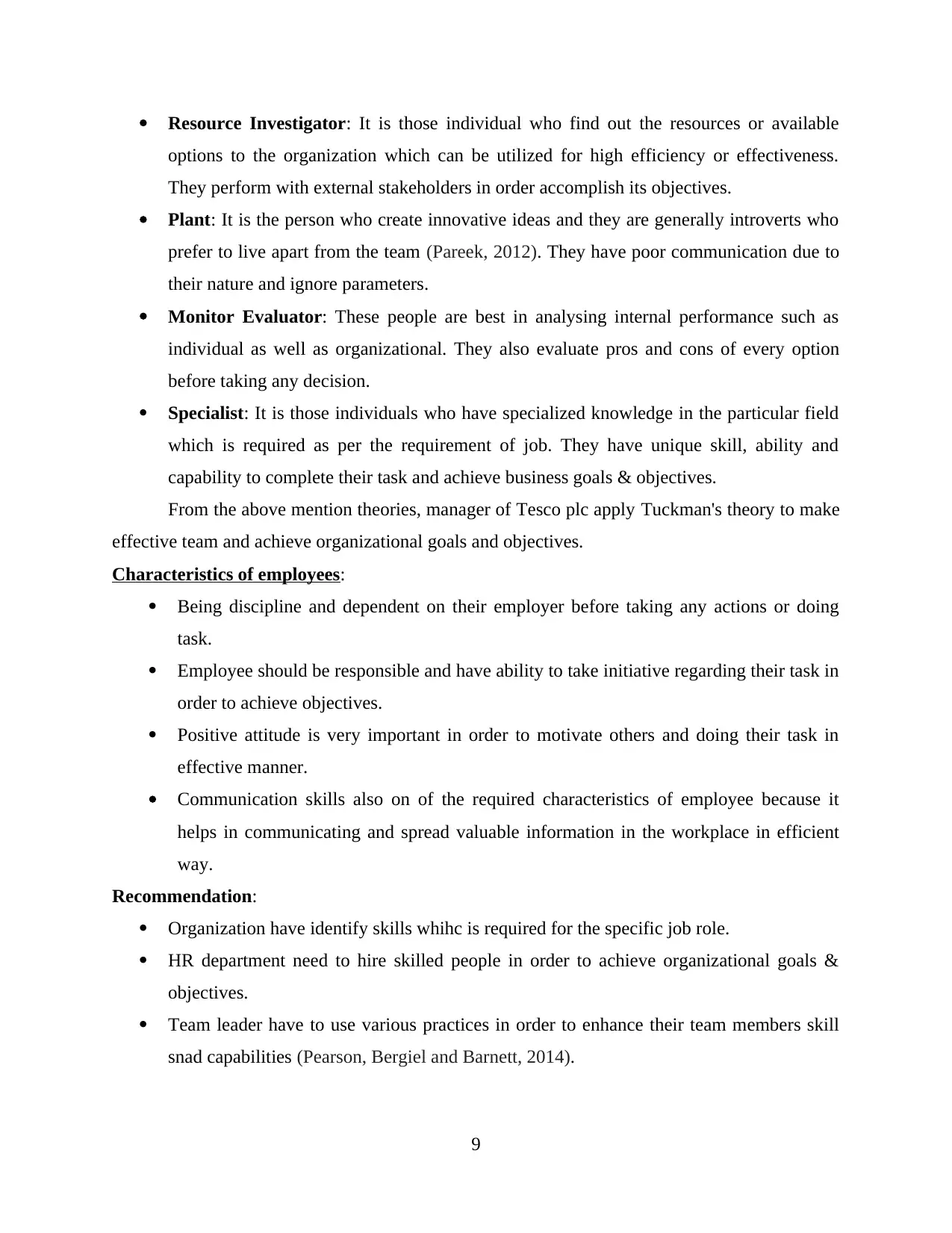
Resource Investigator: It is those individual who find out the resources or available
options to the organization which can be utilized for high efficiency or effectiveness.
They perform with external stakeholders in order accomplish its objectives.
Plant: It is the person who create innovative ideas and they are generally introverts who
prefer to live apart from the team (Pareek, 2012). They have poor communication due to
their nature and ignore parameters.
Monitor Evaluator: These people are best in analysing internal performance such as
individual as well as organizational. They also evaluate pros and cons of every option
before taking any decision.
Specialist: It is those individuals who have specialized knowledge in the particular field
which is required as per the requirement of job. They have unique skill, ability and
capability to complete their task and achieve business goals & objectives.
From the above mention theories, manager of Tesco plc apply Tuckman's theory to make
effective team and achieve organizational goals and objectives.
Characteristics of employees:
Being discipline and dependent on their employer before taking any actions or doing
task.
Employee should be responsible and have ability to take initiative regarding their task in
order to achieve objectives.
Positive attitude is very important in order to motivate others and doing their task in
effective manner.
Communication skills also on of the required characteristics of employee because it
helps in communicating and spread valuable information in the workplace in efficient
way.
Recommendation:
Organization have identify skills whihc is required for the specific job role.
HR department need to hire skilled people in order to achieve organizational goals &
objectives.
Team leader have to use various practices in order to enhance their team members skill
snad capabilities (Pearson, Bergiel and Barnett, 2014).
9
options to the organization which can be utilized for high efficiency or effectiveness.
They perform with external stakeholders in order accomplish its objectives.
Plant: It is the person who create innovative ideas and they are generally introverts who
prefer to live apart from the team (Pareek, 2012). They have poor communication due to
their nature and ignore parameters.
Monitor Evaluator: These people are best in analysing internal performance such as
individual as well as organizational. They also evaluate pros and cons of every option
before taking any decision.
Specialist: It is those individuals who have specialized knowledge in the particular field
which is required as per the requirement of job. They have unique skill, ability and
capability to complete their task and achieve business goals & objectives.
From the above mention theories, manager of Tesco plc apply Tuckman's theory to make
effective team and achieve organizational goals and objectives.
Characteristics of employees:
Being discipline and dependent on their employer before taking any actions or doing
task.
Employee should be responsible and have ability to take initiative regarding their task in
order to achieve objectives.
Positive attitude is very important in order to motivate others and doing their task in
effective manner.
Communication skills also on of the required characteristics of employee because it
helps in communicating and spread valuable information in the workplace in efficient
way.
Recommendation:
Organization have identify skills whihc is required for the specific job role.
HR department need to hire skilled people in order to achieve organizational goals &
objectives.
Team leader have to use various practices in order to enhance their team members skill
snad capabilities (Pearson, Bergiel and Barnett, 2014).
9
⊘ This is a preview!⊘
Do you want full access?
Subscribe today to unlock all pages.

Trusted by 1+ million students worldwide
1 out of 15
Related Documents
Your All-in-One AI-Powered Toolkit for Academic Success.
+13062052269
info@desklib.com
Available 24*7 on WhatsApp / Email
![[object Object]](/_next/static/media/star-bottom.7253800d.svg)
Unlock your academic potential
Copyright © 2020–2026 A2Z Services. All Rights Reserved. Developed and managed by ZUCOL.





